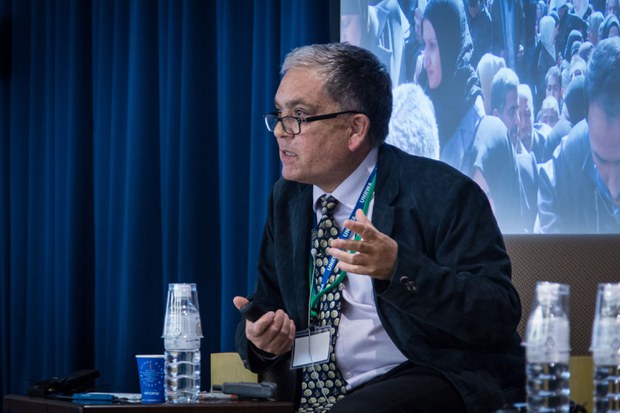Unmarked UN boats used to ferry junta officials to refugee camps, email shows
2023.03.17
 Chris Gunness speaks at the 2014 International Media Seminar on Peace in the Middle East at Sophia University in Tokyo.
Chris Gunness speaks at the 2014 International Media Seminar on Peace in the Middle East at Sophia University in Tokyo.
Burmese military junta officials were transported into Bangladesh aboard United Nations boats on which the organization’s markings had been removed, according to an email from the U.N.’s resident coordinator in Myanmar, a move that could put humanitarian workers at risk.
The U.N.’s boats were used to carry the ruling junta officials to Cox’s Bazar in southeastern Bangladesh on Wednesday, according to the email sent Thursday by Ramanathan Balakrishnan. The email was obtained by the Myanmar Accountability Project and sent to Radio Free Asia (RFA), a news service affiliated with BenarNews.
Junta officials have recently been negotiating a pilot project, mediated by China, that would repatriate about 1,000 Rohingya from Bangladesh to Myanmar. Wednesday’s trip in the unmarked boats was made so that officials could engage in talks and meet with refugees who could return under the pilot program.
The journey was made without an armed escort and no weapons were observed on any of the boats, Balakrishnan wrote in the email. But he told colleagues he was concerned that the trip had created a “reputational risk” for all U.N. agencies and could jeopardize staff security.
The removal of the U.N. logo from the boats was a serious security violation, said Chris Gunness, a former U.N. official who is the director of the Myanmar Accountability Project, a London-based NGO working to build criminal cases against members of Myanmar’s security forces.
“That’s a serious breach of U.N. neutrality and it puts in danger U.N. convoys across Myanmar,” he told RFA. “If rebel groups, if opposition groups and others feel that these transports, these aid convoys are being used by the junta to be transported, they may come under attack. And that puts at risk the lives of humanitarian workers across Myanmar.”
1 million refugees
The area, which borders Myanmar, houses about 1 million refugees from the persecuted Rohingya minority, including about 740,000 who fled Myanmar following a military crackdown in Rakhine state beginning in August 2017.
The U.N.’s refugee agency – the UNHCR – and the World Food Program provided the boats “at the very firm request” of Myanmar junta officials, Balakrishnan said in the email.
The Myanmar delegation has interviewed more than 240 Rohingya since Wednesday, Bangladesh official Khalid Hussain told BenarNews.
More interviews will take place over the next few days, he said.
The UNHCR hasn’t been involved in negotiations between Bangladesh and Myanmar for the pilot program, Balakrishnan said. The position of the U.N. and UNHCR “on return to Myanmar remains unchanged,” he said: conditions in Rakhine are “not conducive to the safe and sustainable return of Rohingya refugees.”
U.N. spokesman Stéphane Dujarric reiterated during Friday’s noon briefing in New York that UNHCR is not involved in the pilot program. He repeated Balakrishnan’s line about the unsafe conditions in Rakhine.
Pilot program or public relations stunt?
Nonetheless, it appears the U.N. was used by the junta “in a vile propaganda stunt” as the regime prepares to hold “sham elections” later this year, Gunness said.
“It’s extraordinary that the U.N. on the one hand says it’s dangerous and then on the other hand is going ahead and supporting this pilot scheme,” Gunness said. “It doesn’t make sense.”
Karin Valtersson, Burma Campaign UK’s Campaigns Officer, echoed that, saying the pilot program appears to be a public relations exercise by the Burmese military and the Bangladesh government.
“The situation inside Rakhine state is still a situation of ongoing genocide and they cannot return at this point, and I don’t think anyone will return,” she told RFA. “The reports that U.N. agencies have been involved are clearly shameful.”
Instead of returning, Rohingya refugees need support in the camps so they can have a decent living standard, with their security guaranteed, she said.
“The security situation in the camps has deteriorated and they cannot be abandoned again by the international community,” she said.
Abdur Rahman in Teknaf, Bangladesh contributed to this report.







